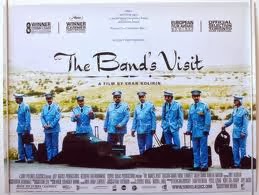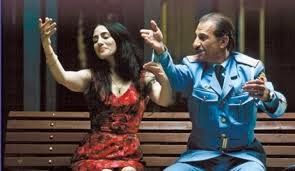 In "The Past", his French language debut, noted Iranian director Asghar Farhadi presents an intense family drama set in Paris. A divorce is at the heart of this movie as in, his 2011 movie, A Separation, which won Iran's first Academy Award for Best Foreign Language Movie.
In "The Past", his French language debut, noted Iranian director Asghar Farhadi presents an intense family drama set in Paris. A divorce is at the heart of this movie as in, his 2011 movie, A Separation, which won Iran's first Academy Award for Best Foreign Language Movie.Ahmad (Ali Mosaffa) is an Iranian who comes to Paris to settle his divorce with Marie, a French pharmacist. Marie (Bernice Bejo, from The Artist) and Ahmad have been separated for four years. Soon after his arrival, Marie informs Ahmad of her plans to marry Samir (Tahir Rahim), an Arab laundromat owner and that they are also expecting a child. Marie has two daughters from an earlier marriage - Lucie, a sullen teenager and the younger Lea. Samir has a wife who is in coma after an attempted suicide and a young son, Fouad. After the hospitalisation of his wife, Samir and Fouad have moved in with Marie. While the young Lea sees a similar-aged playmate in Fouad, Lucie cold shoulders Samir and hates her mother for rushing into a marriage with him. Lucie, however, shares a warmer relationship with Ahmad, her earlier stepfather. Ahmad finds himself playing the mediator between various players and in the process, gradually unravels a secret that puts all the players on the brink.
 Farhadi presents an intricately woven drama and draws the viewers ever so deep into the unfolding events. His characters - each with their deep flaws, guilt, vulnerabilities, doubts and emotional baggage from their past - are very real in their attempts to grapple with their situations. Their struggle to disentangle their present and construct a clear future is clouded by the events from their past which threaten to unravel their plans. Are they to permanently remain the prisoners of their past and mistakes committed therein ? Or, can they find a way to disentangle their present and forge new and happier ties that they seek ? Farhadi explores these questions and more in this intricately constructed narrative structured as a socio-emotional thriller.
Farhadi presents an intricately woven drama and draws the viewers ever so deep into the unfolding events. His characters - each with their deep flaws, guilt, vulnerabilities, doubts and emotional baggage from their past - are very real in their attempts to grapple with their situations. Their struggle to disentangle their present and construct a clear future is clouded by the events from their past which threaten to unravel their plans. Are they to permanently remain the prisoners of their past and mistakes committed therein ? Or, can they find a way to disentangle their present and forge new and happier ties that they seek ? Farhadi explores these questions and more in this intricately constructed narrative structured as a socio-emotional thriller.  Farhadi shows a keen eye in his attention to details (as in the case of Marie's house where most of the drama unfolds across several rooms) and brilliance in his intelligent metaphors which serve as subtle markers to the future events including the initial meeting of Marie and Ahmad across a glass wall at the airport, their clumsy attempt to back their car from parking as well as the manner of title appearing on the windscreen of the car that is wiped away or even in Ahmad agreeing to clear up the mess of spilt paint.
Farhadi shows a keen eye in his attention to details (as in the case of Marie's house where most of the drama unfolds across several rooms) and brilliance in his intelligent metaphors which serve as subtle markers to the future events including the initial meeting of Marie and Ahmad across a glass wall at the airport, their clumsy attempt to back their car from parking as well as the manner of title appearing on the windscreen of the car that is wiped away or even in Ahmad agreeing to clear up the mess of spilt paint.The film benefits a great deal from the fact that Farhadi employs a solid cast that is strikingly beautiful and have enough acting chops for playing these complex characters and they have put in remarkable performances which makes the drama connect to the viewers. Ali Mosaffa is exceptional as the Ahmad, a man trying find some calm after finding himself unsuspectingly drawn into the middle of a raging storm of relationships of his estranged family and Tahir Rahim plays the brooding Samir with an assured subtlety. However, it is Bernice Bejo who packs in a powerful performance as the enigmatic and the fierce Marie whose present is caught between her past grievances and the future questions. Her performance has already received a well deserved Best Actress award at the Cannes last year. Farhadi also draws wonderful performances from his younger cast, especially Pauline Burlet who plays an angry, yet helpless Lucie who is disenchanted with the situation she finds herself in and Elyes Aguis as Fouad who is torn between the comatose mother he loves and mother imposed upon him.
 The Past is an engaging family drama which underscores the dynamics of dysfunctional families and their effects on the children who are often ignored in the confrontations between the adults of the family. With The Past, Asghar Farhadi has reinforced his position as a master in presenting intricately crafted human dramas populated by nuanced, real characters which have universal appeal. Kudos !!
The Past is an engaging family drama which underscores the dynamics of dysfunctional families and their effects on the children who are often ignored in the confrontations between the adults of the family. With The Past, Asghar Farhadi has reinforced his position as a master in presenting intricately crafted human dramas populated by nuanced, real characters which have universal appeal. Kudos !!A MUST WATCH !!























